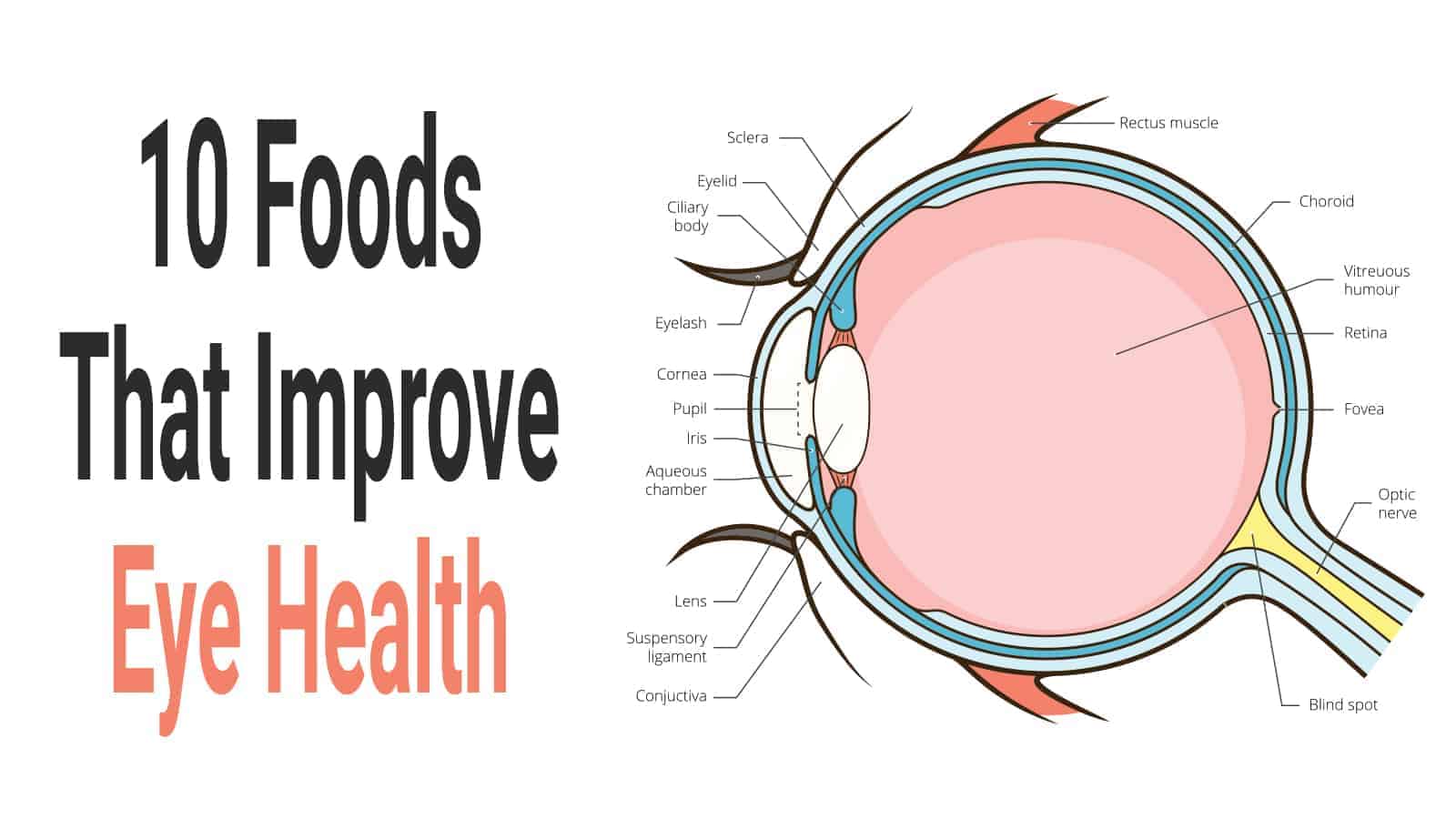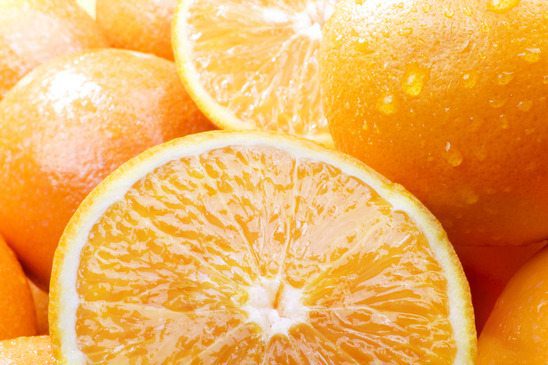Our eyes are irreplaceable, and the vision they provide makes our world much more easy to navigate. A lot of people know that eye strain causes long-term damage to the eyes. Many people also believe eye deterioration is part and parcel of aging – but what if there was a way to prevent that and have better eye health?
Believe it or not, paying attention to your diet can help determine the condition of your eyes. A 2001 renowned Age-Related Eye Disease Study found that certain nutrients can actually reduce the risk and rate of developing these types of eye conditions by as much as 25%.
This means that being selective in your food choices and including options that have been scientifically proven to help the eyes can be all it takes to keep your eyes healthy.
Here Are 10 Foods That Improve Eye Health
1. Sweet Potatoes
Sweet potatoes are packed with a component known as beta carotene. This nutrient is converted within the body and turned into vitamin A, which is arguably the most famous vitamin for eye health.
Beta carotene is known for its ability to prevent or delay macular degeneration, and its resulting vitamin A can help the eyes stay sharp. This keeps you protected against dry eyes, infection, and also night blindness.
These tubers are also great for providing additional vitamin C and vitamin E so your body is kept healthy along with your eyes.
2. Salmon
Omega-3 fatty acids are great for eye health. Insufficient amounts can cause dry eyes, especially the type resulting from prolonged computer use. This nutrient is also capable of protecting the eyes from conditions like glaucoma and age-related macular degeneration.
But why salmon? Well, there are actually two kinds of omega-3 fatty acids that you need in order to reap full rewards: EPA and DHA. Fatty fish like this one has both of them. Eating enough can improve retinal health and even provide benefits for development.
Your best option for choosing salmon are wild-caught varieties. This isn’t to say that farm-raised don’t have omega-3, but they do have much less. Wild-caught salmon also has lower levels of cholesterol, which is more positive for your body on the whole.
Of course, it doesn’t have to just be salmon. Though salmon offer the most omega-3 out of all the options, there are plenty of fish choices that can provide similar results. Here are some examples:
- Tuna
- Mackerel
- Trout
- Herring
- Sardines
- Anchovies
- Other seafood
3. Leafy Greens
Leafy green veggies are packed with vitamin C and vitamin E, which have both been proven to be good for eye health. But there’s something else they contain that makes them so good: carotenoids. Carotenoids are plant-based compounds, and leafy greens specifically have zeaxanthin and lutein.
Those two compounds are essentially vitamin A types found in plants. They’re great forms of nutrient but sadly largely absent from a lot of Western diets. They’re good for protection against cataracts and age-related macular degeneration.
One of the absolute best of these leafy greens to go for is kale. Not only does it have superfood status that makes it good for all of your body, from strength to immunity to positive thinking, but it has very high amounts of lutein (11.4 mg per 100 g) and zeaxanthin.
Not a fan of kale? Try these options:
- Collard greens
- Spinach
- Red pepper
You can also opt to make kale chips by tossing small, washed leaves in olive oil and baking till crispy. Add some salt over the top and you’re good to go!
4. Eggs
We’ve already talked about lutein and zeaxanthin, and guess what – eggs have a lot of them. These compounds have been proven to reduce the risk of developing a number of different eye conditions, especially ones that become more likely with age, so eggs are great foods that improve eye health.
- Not only that, but eggs also have lots of vitamin A and zinc.
- Vitamin A keeps the eye’s surface, known as the cornea, safe from damage.
- Zinc, meanwhile, keeps the back of the eye, known as the retina, healthy and strong.
- Zinc is also good for better night vision.
Keep in mind you have to eat the whole egg to get all these benefits, not just the whites or the yolk. The yolk has the zeaxanthin and lutein, while the white has the zinc. These components actually work together, as zinc helps the other two components be absorbed and used by the body.
Together, they’re good for preventing blue light damage and they keep the eye’s macula strong through more protective pigment. Since the macula is crucial for central vision abilities, it makes sense that eggs are just great for the entire eye as a whole – its front, back, and middle.
5. Carrots
People have always made jokes about rabbits having great eyesight because of all the carrots they eat. While it doesn’t exactly work that way, there’s no denying that carrots do, indeed, provide a lot of positive benefits to overall eye health.
Carrots are packed with both beta carotene and vitamin A. Both can boost the strength of the eye’s surface, ward off possible infections, and reduce the risk of developing a number of diseases that can have serious, lasting effects.
Vitamin A is expected to work so well for eye health because it is one of the components of rhodopsin. Rhodopsin is a protein that helps the eye’s retina work on absorbing light more, so it gives you stronger vision, especially at night.
6. Nuts, Legumes, Seeds, and Beans
These four types of food are great options as they have a lot of vitamin E and omega-3 fatty acids, especially almonds. Eating enough vitamin E can help keep away unstable molecules that could damage healthy tissue within the body. This is why this vitamin is good for stopping the risk of cataracts and age-related macular degeneration.
Some examples of nuts you can eat for this purpose are:
- Walnuts
- Hazelnuts
- Cashews
- Brazil nuts
- Peanuts
Some examples of seeds you can eat for this purpose are:
- Sunflower seeds
- Flax seeds
- Chia seeds
- Hemp seeds
Beans and legumes have the additional benefit of having a high zinc content alongside their omega-3 and vitamin E amounts. Some examples of beans and legumes you can eat for this purpose are:
- Lentils
- Kidney beans
- Chickpeas
- Black-eyed peas
- Baked beans
- Peanuts
7. Citrus
When we think of citrus fruits, we typically think of vitamin C. This vitamin is an antioxidant too, and the American Optometric Association recommends sufficient consumption of this component to boost eye health and keep potential damage and disease to the eyes at bay.
Vitamin C helps the blood vessels inside the eyes, keeping them strong and healthy. This is why they can prevent cataract development, and also help reduce the risk of age-related macular degeneration. Some examples of citrus fruits you can consume to improve eye health are:
- Grapefruit
- Oranges
- Lemons
Humans don’t have the ability to naturally make vitamin C on their own within the body. This is why ensuring that you get enough of this vitamin is so crucial to overall health. The fact that vitamin C helps the health of all other parts of the body too makes this a done deal.
8. Lean Meat
Lean meats, especially beef, are packed with a mineral called zinc. As we mentioned previously, zinc is important as it has positive effects on the way the body processes and uses vitamin A. Without enough zinc, vitamin A may not be brought up to the retina from the liver, so the protective melanin pigment in the eyes can’t get the boost they need.
You can also get a lot of zinc through oysters, which have a huge amount of zinc for their size – more than any other type of food per serving, with beef being the next best option. If that’s not your thing, you can also get a zinc fix from chicken (whether breast meat or dark meat) and pork loin.
9. Dairy
With both vitamin A and zinc, dairy products pack a powerful punch in combating eye problems. Yogurt and milk provide these components. Vitamin A helps the cornea while the zinc brings that vitamin up into the eyes where it can be put to good use.
Zinc is actually present in the eye naturally, especially in the retina and the vascular tissue beneath it, known as the choroid. It is there to help night vision and to boost cataract protection. Consuming more zinc can, in turn, further assist in this cause and provide even more positive results.
Your best bet when picking dairy products is grass-fed cow products, as they maintain the most nutritional benefit compared to factory farmed products.
10. Water
Everyone says drinking water is the best way to good health. People do tend to overstate this, which is why it’s such a joke on the Internet now. But the truth is that while water can’t solve everything, it certainly can do a whole lot! We can’t get into everything water can do, but suffice to say it has positive effects on eye health.
Our eyes are made up of plenty of fluids. Like every other part of the body, eyes need water in order to retain moisture and keep functioning optimally. Water is necessary for clear vision, and it keeps the eyes in good shape.
A lack of water leads to body-wide dehydration, which in turn, affects the eyes. This is why dry eyes can often be alleviated somewhat by drinking extra water.
Final Thoughts On Foods That Improve Eye Health
No one wants to lose their vision. But aging comes with challenges that may lead to this unfortunate result. Still, don’t fear, and maintain positive thinking! By eating these foods that improve eye health, you’ll be able to boost the protection, strength, and overall condition of your eyes so they continue working well even as you grow older.
If you suspect that you may have a serious eye condition, then, of course, you shouldn’t rely solely on these foods. Speak to a doctor immediately for a check-up. If you would like additional help in keeping your eyes healthy as you age, a medical professional can help you find good options!




















